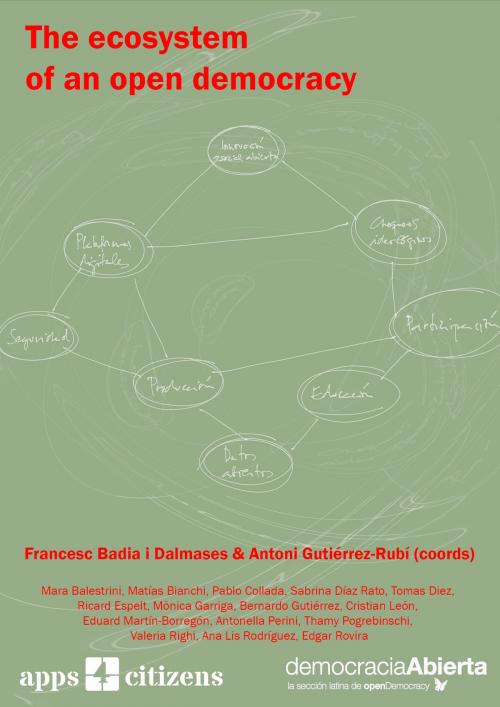The Ecosystem of an Open Democracy
Nonfiction, Social & Cultural Studies, Political Science, Government, Public Policy| Author: | Mara Balestrini, Matías Bianchi, Pablo Collada, Sabrina Díaz Rato, Tomas Diez, Ricard Espelt, Mònica Garriga, Bernardo Gutiérrez, Cristian León, Eduard Martín Borregón, Antonella Perini, Thamy Pogrebinschi, Valeria Righi, Edgar Rovira, Francesc Badia Dalmases, Antoni Gutiérez Rubí | ISBN: | 9788417073329 |
| Publisher: | LuzAzul ediciones | Publication: | May 25, 2018 |
| Imprint: | Language: | Spanish |
| Author: | Mara Balestrini, Matías Bianchi, Pablo Collada, Sabrina Díaz Rato, Tomas Diez, Ricard Espelt, Mònica Garriga, Bernardo Gutiérrez, Cristian León, Eduard Martín Borregón, Antonella Perini, Thamy Pogrebinschi, Valeria Righi, Edgar Rovira, Francesc Badia Dalmases, Antoni Gutiérez Rubí |
| ISBN: | 9788417073329 |
| Publisher: | LuzAzul ediciones |
| Publication: | May 25, 2018 |
| Imprint: | |
| Language: | Spanish |
Within the framework of “political experimentation”, a perspective from which to observe the vibrant development of political innovation in Latin America – and also in Spain -, we have published the serie of The ecosystem of an open democracy article. This is a Democracia Abierta initiative in collaboration with apps4citizens, a Barcelona-based platform that promotes the development of technology for purposes of social and political collective commitment.
For some years now, we have been witnessing the emergence of relational, crossover, participatory power. This is the territory that gives technopolitics its meaning and prominence, the basis on which a new vision of democracy – more open, more direct, more interactive – is being developed and embraced. It is a framework that overcomes the closed architecture on which the praxis of governance – closed, hierarchical, one-way – has been cemented in almost all areas, resulting in high levels of disaffection towards traditional organizations: parties and institutions, unions and non-profit organizations, the media and the universities.
What are the essential elements to understand this new scenario? How are power roles being reshaped? How do technology platforms contribute to this transformation? The answers to these questions are key to understanding this new ecosystem.
To this end, we have commissioned a series of articles, covering the different aspects which are contributing to the emergence of the ecosystem of an open democracy, published during the first semester of 2017 and collected in this ebook.
Within the framework of “political experimentation”, a perspective from which to observe the vibrant development of political innovation in Latin America – and also in Spain -, we have published the serie of The ecosystem of an open democracy article. This is a Democracia Abierta initiative in collaboration with apps4citizens, a Barcelona-based platform that promotes the development of technology for purposes of social and political collective commitment.
For some years now, we have been witnessing the emergence of relational, crossover, participatory power. This is the territory that gives technopolitics its meaning and prominence, the basis on which a new vision of democracy – more open, more direct, more interactive – is being developed and embraced. It is a framework that overcomes the closed architecture on which the praxis of governance – closed, hierarchical, one-way – has been cemented in almost all areas, resulting in high levels of disaffection towards traditional organizations: parties and institutions, unions and non-profit organizations, the media and the universities.
What are the essential elements to understand this new scenario? How are power roles being reshaped? How do technology platforms contribute to this transformation? The answers to these questions are key to understanding this new ecosystem.
To this end, we have commissioned a series of articles, covering the different aspects which are contributing to the emergence of the ecosystem of an open democracy, published during the first semester of 2017 and collected in this ebook.















